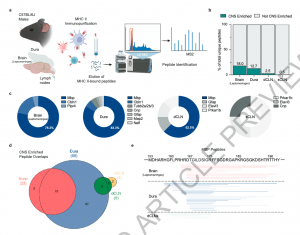New research uncovers the brain’s sophisticated mechanism for balancing immune responses, which may help in developing improved therapies for diseases like multiple sclerosis (MS) and Alzheimer’s (Figure 1). In a study conducted in mice, researchers identified fragments of immune-stimulating proteins, named “guardian peptides,” produced by the brain and spinal cord to maintain this immune balance. The study reveals that these peptides allow a healthy exchange of information between the brain and the immune system.

Extended Data Figure 1: Characterizing the CNS MHC II Peptidome of C57BL/6J male mice. a, Peptide length distribution represented as a percent of the total number of unique peptides identified by the MHC II peptidome for the brain (which also includes the leptomeninges), dura, dCLNs, and sCLNs. b-e, Representative flow cytometry plots depicting the gating strategy used to identify the distribution of MHC II-expressing cells. Within the MHC II+ gate, B cells (gated on CD19+ CD11c–), dendritic cells (DCs, gated on CD19– CD11c+), and macrophages (MΦ, gated on CD19– CD11c– CD11b+) were identified. To the right, bar plots show the frequency of the aforementioned antigen presenting cells as a percent of CD45+ MHC II+ cells for the (b) brain, (c) dura, (d) dCLNs, and (e) sCLNs. (n=5 mice analyzed over 2 independent experiments; data shown as mean±s.e.m). f, Violin plot depicting predicted binding affinities for unique MHC II-bound peptides. The median is represented by a solid line and the first as well as the third quartiles are represented by dashed lines. P-values indicated on plot (one-way ANOVA with Tukey’s multiple comparisons test). g, Venn diagram depicting the relationship between all unique MHC II-bound peptides in the brain, dura, dCLNs, and sCLNs. h, Summary of individual peptides identified on the MBP sequence as defined by the MHC II peptidome of C57BL/6J male mice. (source: https://www.nature.com/articles/s41586-024-08279-y).
The brain’s immune system engagement is crucial for managing both protection against infection and preserving healthy tissue. The guardian peptides play an active role in moderating immune responses, potentially preventing harmful immune reactions. The peptides interact with regulatory T cells at the brain’s borders, where immune cells evaluate the need for a response. When these T cells encounter the guardian peptides, they trigger a controlled, protective response rather than an aggressive one, supporting the brain’s “immune privilege” status and preventing unnecessary tissue damage.
In healthy mice, the study revealed that immune cells at the brain’s borders frequently present these peptides, particularly a protein from the myelin sheath—a protective covering on neurons damaged in MS. In mice with MS, however, the researchers observed a sharp decrease in these protective peptides. To investigate the therapeutic potential of these peptides, the researchers introduced brain-derived peptides in vesicles (membrane-bound compartments) into the cerebrospinal fluid of mice with MS. This treatment activated suppressor T cells, which reduced abnormal immune responses, improved motor function, and slowed disease progression.
They examined immune-presenting cells from healthy mice brains, finding abundant brain proteins presented to immune cells. However, in mice with MS, this presentation was significantly altered, indicating that diseases like MS might disrupt the brain’s “healthy image” presented to the immune system. This discovery opens the door to exploring protein signatures in other neuroinflammatory and neurodegenerative diseases as potential diagnostic tools.
With guardian peptides presenting a clear “self” image to the immune system, future treatments might harness these peptides to suppress abnormal immune activity in neuroinflammatory and neurodegenerative diseases. This study not only provides a deeper understanding of the brain’s immune modulation but also hints at new diagnostic and therapeutic pathways that could transform approaches to managing and diagnosing neuroinflammatory diseases.
Journal article: Min Woo Kim, M.W., et al. 2024. Endogenous self-peptides guard immune privilege of the central nervous system. Nature.
Summary by Stefan Botha










